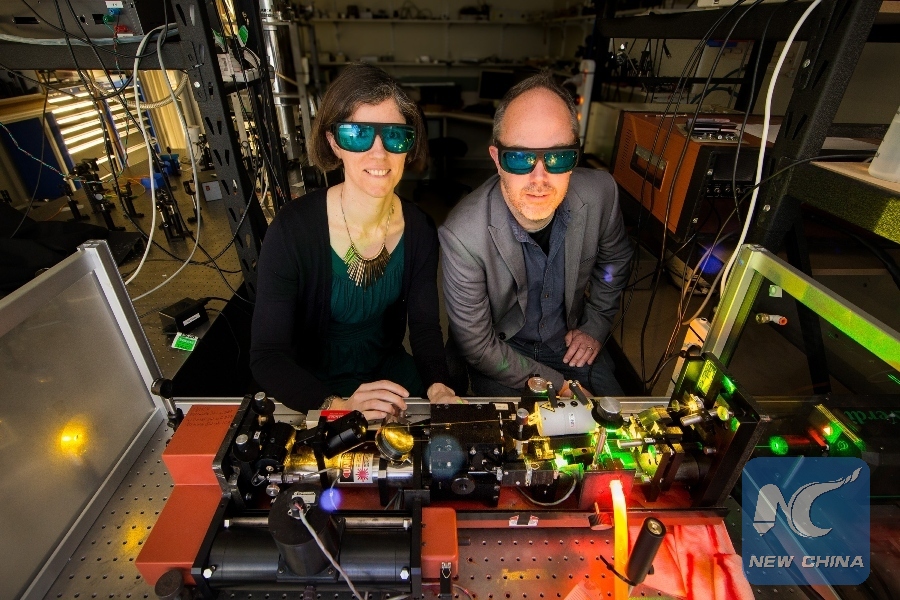
Doctor Rose Ahlefeldt (L) and Associate Professor Matthew Sellars try to operate a high resolution dye laser, which they use to study rare earth crystals in the Australian National University (ANU), Canberra, on Sept. 6, 2017. Australian scientists have made a significant breakthrough in developing an "unhackable" quantum internet, it was announced on Sept. 12. (Xinhua/ANU/Stuart Hay)
LOS ANGELES, Nov. 26 (Xinhua) -- U.S. researchers developed a high-speed encryption system that may prevent hackers from breaking into computer systems. These quantum encryption techniques may be one step closer to wide-scale use.
According to the new study, published online this week in Science Advances, the system is capable of creating and distributing encryption codes at megabit-per-second rates, which is five to 10 times faster than existing methods and on par with current internet speeds when running several systems in parallel.
The researchers at Duke University, The Ohio State University and Oak Ridge National Laboratory, demonstrate that the technique is secure from common attacks, even in the face of equipment flaws that could open up leaks.
"We are now likely to have a functioning quantum computer that might be able to start breaking the existing cryptographic codes in the near future," Daniel Gauthier, a professor of physics at The Ohio State University, was quoted as saying in a news release. "We really need to be thinking hard now of different techniques that we could use for trying to secure the internet."
Recent advances in quantum computers may soon give hackers access to machines powerful enough to crack even the toughest of standard internet security codes, according to the research.
To a hacker, that all personal information would appear indecipherable gibberish due to ciphers called encryption keys. The quantum system would ensure that all such information is first scrambled and then be unscrambled by the receiver, using one of these keys.
For this system to work, both parties need to have access to the same key, and it must be kept secret. The developed research of quantum key distribution (QKD) makes this secure through quantum mechanics, measuring tiny bits of matter like electrons or photons automatically changes their properties, to exchange keys in a way that immediately alerts both parties to the existence of a security breach.
Though QKD was first theorized in 1984 and implemented shortly thereafter, the technologies to support its wide-scale use are only now coming online. Companies in Europe now sell laser-based systems for QKD, and in a highly-publicized event last summer, China used a satellite to send a quantum key to two land-based stations located 1200 km apart.
But Nurul Taimur Islam, a graduate student in physics at Duke, explained the problem with many of these systems is that they can only transmit keys at relatively low rates, between tens to hundreds of kilobits per second, which are too slow for most practical uses on the internet.
"At these rates, quantum-secure encryption systems cannot support some basic daily tasks, such as hosting an encrypted telephone call or video streaming," Islam said.
Like many QKD systems, Islam's key transmitter uses a weakened laser to encode information on individual photons of light. But they found a way to pack more information onto each photon, making their technique faster.
By adjusting the time at which the photon is released, and a property of the photon called the phase, their system can encode two bits of information per photon instead of one.
This trick, paired with high-speed detectors developed by Clinton Cahall, graduate student in electrical and computer engineering, and Jungsang Kim, professor of electrical and computer engineering at Duke, powers their system to transmit keys five to 10 times faster than other methods.
"It was changing these additional properties of the photon that allowed us to almost double the secure key rate that we were able to obtain if we hadn't done that," said Gauthier, who began the work as a professor of physics at Duke before moving to OSU.
In a perfect world, QKD would be perfectly secure. Any attempt to hack a key exchange would leave errors on the transmission that could be easily spotted by the receiver. But real-world implementations of QKD require imperfect equipment, and these imperfections open up leaks that hackers can exploit, according to the researchers.

